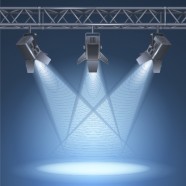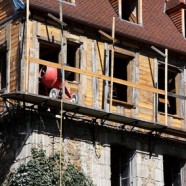6 Types of Security Lighting for the West Palm Beach Home
A security lighting system in your West Palm Beach home is the smartest inexpensive theft deterrent you can find. Thieves and burglars look for homes they can ransack without being seen, and darkness is one of their biggest tools. If your house is well-lit in a multitude of ways, thieves are more likely to move on to one of your less-prepared neighbors when planning a job. Your home is likely your largest investment; it pays to invest in multiple types of security lighting to keep your family and property safe.
#1: Motion Activated Floodlights
It’s smart to install general purpose floodlights that cover your entire yard, but it makes no sense to have them running all night long. That just wastes power and raises your electrical bill. Have your electrical contractor in West Palm Beach install motion activated lights around your property. When someone moves onto your property a bright light will shine on him, preventing him from sneaking into the house under cover of darkness. The sensitivity on these lights can be adjusted to ignore smaller woodland creatures, only turning on when there’s an actual human threat in the area.
#2: Timed Security Lighting
When you want your property at least slightly lit at all times, but still don’t want outrageous electrical bills, timed lighting is what you need. These lights are dimmer than motion-activated floodlights, but they are on a timer, and can be set for a certain number of hours each night. Set the timer for a few hours after you go to bed, or leave outdoor lights on all night until dawn. Either way, you’ll cut your power usage from simply leaving floodlights on all night light.
#3: Coach Lights
When calling on electrical renovation services, include coach lights on your list of possibilities. These lights illuminate sidewalks and driveways, while adding charm and good looks to your property. You’ll be able to safely walk to your car and around your property without the commercial look of traditional floodlights.
#4: Soffit Lights
If deterring thieves is the main purpose of outdoor security lighting, then lighting up the outside of your West Palm Beach house must be crucial for any security plan. Soffit lights aren’t used very often these days, but they can add an element of brightness and visibility to the front of any house. The soffit is the slight overhang on the front of your house face. Soffit lights hang from this overhang, or are built right into it. They supply lighting that bathes the front of the house where the front porch light might be lacking.
#5: Types of Lights
Traditionally, security lighting was with incandescent bulbs, whether set up high on a pole or set into a fixture next to the front door. Today’s electrical renovation services professionals know that LED lighting is brighter, cooler, safer, and less expensive to use in all types of lighting situations. The lights use a fraction of the power that traditional bulbs use, but they’re many times brighter, giving you a safer property for less money. Your contractor can replace any traditional security lights you have with LED lighting during renovations, and if you’re adding a new lighting system, LED bulbs are the preferred way to go.
#6: Solar Lights
For an additional lighting pop, solar lights are an inexpensive choice for your landscape lighting. They generally don’t give off anywhere near the same amount of light as an LED bulb, though, so they should only been seen as an addition, attractive type of lighting to add to your security package. They’re great for placing beside walkways, giving you more secure footing at night, but they’re not useful for primary lighting in your security plan.
Read MoreHow to Maintain Your Outdoor Landscape Lighting in Good Condition
Spot lighting and general area lighting are an attractive and important part of many landscape plans. Why put in elaborate trees and hedge designs if you can’t see them after dark? If you’ve decided to include landscape lighting in the plans for your property, set up an electrical maintenance schedule to keep your lights in good running order. Your residential electrical contractor can not only install all the outdoor light designs you want, he can tell you when your system needs maintenance during the year.
Visibility
Landscape lighting, by its nature, is set close to the ground and is vulnerable to damage from all landscaping machines such as lawnmowers and weed trimmers. Placing a set of green lights in the middle of the lawn might be a good design choice, but those lights aren’t likely to last long. They’ll fall victim to your lawnmower before the end of summer, most likely. Either choose a color that stands out from the lawn, such as black or a color to match your flowers, or put something around each light fixture that draws the eye. White wire fencing is inexpensive, light, and simple to install, yet you’ll see them from halfway across the yard. And lights that you see are less likely to be damaged.
Materials
The atmosphere in your environment makes a big difference when it comes to your ability to maintain landscape lighting. Some metal fixtures can corrode when installed in salt air, like the air that’s found in southeastern Florida. Although you may love the look of other metals, brass and copper are superior finishes for salt air. They may patina over time, but they’re meant to, and the change in color is a natural process that won’t affect your lights’ operating ability.
Dead Light
One of the simplest forms of electrical maintenance happens when a light bulb seems to blow out. Often, it’s not the bulb but the socket in which it’s placed. Unplug the lighting system to make sure no power is running through it, then take the top off the light. Replace the bulb with another one from the same string. If the bulb still won’t light, you probably have corrosion in the socket. Cut down an emery board until it’s small enough to fit into the slot where the bulb goes, and slide it up and down to file off any corrosion that may be built up on the contacts. When you replace the bulb and turn the power back on, the lights should work like normal.
Maintaining Lights
Your residential electrical contractor should come out twice a year for basic maintenance. He should change all the bulbs to prevent them from burning out at inopportune times. He’ll also spray a corrosion preventative compound to the base of the lamp to help prevent salt air and sprinkler moisture from corroding the light’s contacts. New corrosion preventative should be applied each time the lights are changed.
Electrical Outlet
One of the best ways to maintain your landscape lighting is to make sure it’s connected to a safe system. Since the outlet and plug for your lights will be outdoors in the elements and subject to rain, the plug should be connected to a GFCI outlet. If your home doesn’t have this available, have your electrical contractor install one at the same time the lights are installed, or as soon after as possible if you’re inheriting an older system.
Read More3 Ways to Achieve Energy Savings in the Home
Upgrading and improving the electrical usage in your home doesn’t have to mean getting a larger electrical bill every month. In fact, newer appliances, lighting, and fixtures are more efficient than the older ones you’ll be replacing. Plan your electrical renovation with energy conservation in mind. Your electrical contractor will know about all the newest additions you can use to improve your energy conservation, so involve him at the very beginning of the planning stage to get the most effective results.
#1: Insulation
One of the most effective ways to save money on energy is to simply not waste it. Make sure you have an effective insulation layer installed in your entire home, to prevent heat from leaking out in the winter and air conditioning in the summer. Some of the places you might not have considered are:
- Around the ductwork underneath the house
- At the access point where the dryer vent goes through the wall to the outside
- Between the floor and the crawlspace beneath the house
Look through your home for cool spots or places where the floor is especially cold in the winter to help track down the leaks where your energy and money are quietly sneaking outside.
#2: Lighting
The least expensive type of lighting is completely free: sunlight. Open your drapes and curtains on all sides of the house during the day, especially during the colder months of the year. Not only can you eliminate the need for keeping lights on during the day, the sunshine will add a certain amount of heat to the interior of your house, cutting down on the power needed to run your furnace.
When you do need to turn on the lights, save even more in energy costs by having an LED retrofit done where you currently have incandescent or older fluorescent bulbs. LED lights are cooler, so you’ll save money on air conditioning in the heat of summer, but they only use a fraction of the amount of electricity to run and they last about ten times longer than traditional bulbs, for the most part.
#3: New Technology
One of the advantages of planning a renovation with an electrical contractor is that he can let you know about new technology you may not have heard about. Incorporating this new tech into your home can increase your energy conservation and, as a consequence, save yourself money on your FPL bill each month.
Timers for your lights are nothing new, but today’s timers can control your whole house’s electrical system. Install an advanced timer in your home and your outdoor lighting will come on from dusk to dawn, the bathroom light will turn off after your kids leave it on, and lights will go on and off when you’re not there to fool burglars into thinking you’re home.
Saving money on lights is good, but energy conservation with HVAC will save you much more money. A programmable thermostat will allow you to set the heat or air conditioning temperature to different levels for different times of the day. Don’t heat the house when you’re gone, turn the heat down for a cool and comfortable night’s sleep, but warm up the house half an hour before the kids’ toes hit the tile floor. By only using power when it’s most needed, you’ll be more comfortable while using less energy.
Read MoreElectrical Construction: What to Look For in a Licensed Electrician
Every new building, from commercial ventures to new homes, needs a solid electrical construction plan at its core. The professionals you hire begin with electrical blueprints, adding in the plans for wiring, construction, and testing of electrical components. With all the costs related to new construction, you might be considering using a general handyman or builder to take care of your new electrical needs. This can end up costing you more in the end for many reasons, from inefficient wiring plans to outright unsafe electrical systems. Electrical construction professionals have specialized training, and will make sure you get the quality job you need that lasts. When you’re ready to look for a licensed electrician, keep these ideas in mind to help you decide:
The Construction Job
Each licensed electrician is something of a specialist, even if he is proficient with many types of projects. Once you have decided exactly what type of job you need done, look for an electrical professional who specializes in jobs similar to the one you need done. Speak with others in your community who have had similar projects done, and ask for recommendations. Research local companies and ask them for examples of their work that you can look at. Knowing a licensed electrician is experienced with electrical construction jobs similar to yours is the base on which you’ll build a decision on who to choose.
Proficiency
The two most important aspects of an electrical construction job are safety and reliability. Electricians who work on your project must be proficient in these areas, and be trained and recognize the standards of quality and safety. Look for a licensed contractor who:
- Is familiar with the National Electric Code (NEC), which is the recognized safety standard adopted by the majority of local and state building inspection authorities.
- Is licensed, along with all of his employees, in the jurisdiction where your proposed project is to be located. The contractor should be aware that the project will be inspected by authorities in the project’s jurisdiction, who will expect all rules and guidelines laid down by the NEC to be followed.
- Uses quality materials, planning for his project to last for a long period of time.
- Has been adequately trained, and has trained his employees, to ensure a competent and experienced work force to do your work.
Reputation and Reliability
The contractors you consider for your project can have all the experience and knowledge in the world, but if they’re not reliable, honest, and have good business sense, they’ll do you more harm than good. Local contractors may be the best choice, as they’ve made a financial and emotional commitment to your neighborhood. Find business or homeowners in your area who have used this electrical contractor and ask about their experiences. When narrowing down your choices, ask electricians for references and speak with each of them for information about pros and cons for each candidate.
Questions to Ask Licensed Electricians
Make an appointment to interview each prospective electrician before signing any contracts. The information you find out may sway you toward one choice or the other. Find out about each one’s insurance and warranty policy, and ask for it in writing. Check to make sure the electrician will guarantee that all work will be up to code. What is their policy on redoing work that doesn’t live up to quality standards? Can you have a written estimate and a copy of the electrician’s insurance certificate? A good contractor with a solid reputation to uphold will be happy to answer all these questions and provide you with the requested documentation.
Read MoreGet Your Electrical Contractor to Install Vital Safety and Security Measures
In order for your home or business to be usable, it not only needs to be beautiful but also safe and secure. An electrical contractor is your go-to person when it comes to renovating a house or installing wiring on a new business, but that’s not all he can do for you. An electrician can advise you about safety and security additions you can use in your home, as well as installing them once you decide on a project. Homes and businesses may have different purposes, but in many ways their security and safety needs are very similar.
GFI Sockets
Unregulated electrical current can pose a danger to curious small children as well as employees in a commercial kitchen. When a person is being shocked, it’s the continued effect of the electric current that does real damage to their health. A GFI or Ground Fault Interruptor, is designed to stop the electrical current running to a particular outlet if there is an abnormal diversion of the current. If anything untoward happens while the outlet is in use, a circuit breaker built into the outlet immediately cuts off the power, preventing further injury. GFI outlets are especially common in places where water is present such as bathrooms and kitchens in the home, as well as commercial kitchens and restrooms in businesses of all types.
Emergency Lights
Emergency lighting is the smallest and least expensive form of lighting in case of a power outage, but it provides enough illumination to get yourself and others around you outside safely without running into sharp furniture corners or hot commercial ovens. Emergency light sets are installed over doorways and contain rechargeable batteries connected to a power source. Passive until the power goes out, they then turn themselves on, showing the way to every exit in the room. All emergency exit lights have a lighted face, but many of them also include small spotlights to add further illumination to the room. These lights are mandatory in almost all businesses, but can be installed in homes, as well.
Floodlights
A good percentage of the theft in businesses and homes happens after dark. Thieves feel safer burglarizing buildings when it’s more difficult for people to see them. One of the best ways to prevent this from happening is to light up the outside of your building to make it much easier for people to spot anything illegal that may be happening. Floodlights can be installed in a number of different locations, depending on the landscaping on your property:
- On top of a tall pole
- On the corners of the building
- Hidden in shrubbery
- Attached to sturdy tree branches
Of the two basic types of floodlights, most businesses choose a permanent light, one that runs all night long and is set on a timer. Many homeowners opt for the other type, one that has a motion sensor. The light doesn’t work if nothing is in the yard, but if the motion sensor detects anything moving around on the property, the bright lights will come on, shining on whatever is moving outside.
Alarm Systems
Burglar alarms are the most common basic defense against breaking and entering. In order for an alarm system to work correctly, a licensed professional such as an electrical contractor should do the installation. Most home alarms are connected to entrances such as doors and windows, especially those on the first floor. Alarms on the second floor are less common, but can be installed for additional protection. Businesses install alarms on all doors and windows, and some businesses invest in additional motion sensor technology, especially in the case of stores with valuable merchandise on display. Most alarm systems will sound some sort of noise or warning when they are set off, and all of them should be connected to a phone line so that an automated message can be sent to the police or alarm monitoring company.
Read MoreElectrical Contractor Costs: Factors in Renovating Your House
Older homes in south Florida may have classic looks, but renovating them will almost always include replacing old wiring and fuse boxes. The amount of renovation needed depends on safety and building code requirements. Depending on whether you’re replacing a fuse box or rewiring an entire guest house, your electrical contractor costs can vary widely. A wide variety of factors affect your final costs, depending on how much you can do yourself, and how complicated the final project becomes.
Do it Yourself
If you’ve successfully completed other home projects, you may feel as if you can do a home rewiring project, saving money for other parts of the renovation. If your only upgrade is to add a ceiling fan or to replace a switch plate, that may be true, but getting a professional is best for anything more elaborate than that. The safety considerations alone are enough to steer you in this direction, but the cost of fixing mistakes made through inexperience can be higher than the original price of the job done right.
Supplies
The cost of your job will depend partly on what supplies you’ll need to finish the job. These can include:
- Filing and pulling a permit to wire your home
- Wiring, outlet covers, switches, and breaker box
- Conduit
- Supplies for repairing walls if needed for access to old wiring
Building Permits
While the cost of a building permit for wiring your renovation job will be the same whether a professional electrician pays for it or you do, a commercial electrical contractor knows exactly what kind of permits are needed and how the local permit process works. He knows exactly what information and paperwork will be needed in order to receive a permit, and which permits you’ll need to get in order to make your project legal and up to code in your neighborhood.
Electrical Panels
If you have one of the classic Art Deco older homes in south Florida, and it hasn’t had its electrical wiring updated in the last few decades, you may be living in a house with an old-fashioned fuse box. Not only is this expensive, it can also be unsafe to use. It’s definitely a sign that the wiring may need replacing. Fuse boxes should always be replaced with modern circuit breakers, which can handle today’s electrical demand much better than its older cousin. Putting in a new circuit breaker will definitely factor in electrical contractor costs, but it can pay for itself in safety features and possible home insurance premiums.
Estimating and Lowering Materials Costs
While you can’t know the final total for renovation and rewiring costs until the job is done, it’s possible to estimate the costs and make an effort to reduce them during the work process. New outlets and switches will have to be installed when a room is rewired, but if you can reuse your old outlet covers and switch plates you’ll save some money on those supplies. If your ceiling fan is still in good condition, your electrical contractor will be able to install it back in place once the wiring is finished without any additional cost for a new fan.
Replacing any outlets or switches can cost between $70 and $120 per item, depending on where the items are placed and whether other wiring has to take place in order to do a successful job. The copper wire itself can be one of the most expensive elements in a renovation project. It can run over $1,000 for a small bungalow-type house, and over $3,000 for larger, multi-bedroom family homes.
Read More






Recent Comments